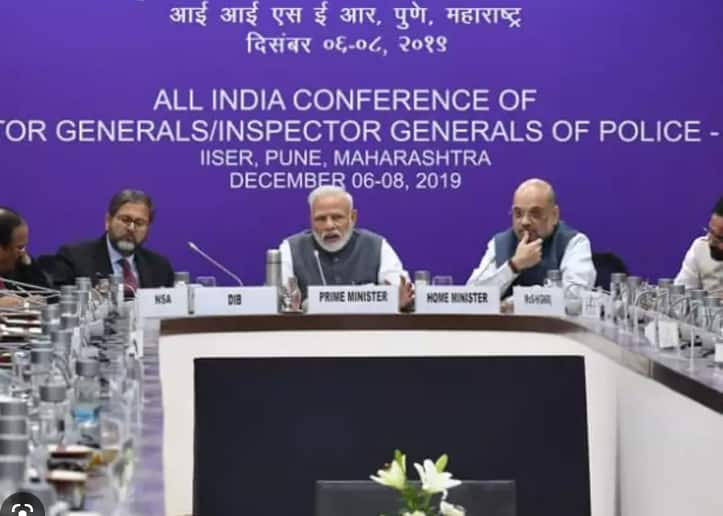


Indian Prime Minister Narendra Modi is set to visit Bhubaneswar today for the three-day-long DG/IGP conference. He will be greeted with a warm welcome and a felicitation program before heading to the Governor's house. During his visit, PM Modi will hold meetings with party officials and discuss development plans for Odisha.
Indian Prime Minister Narendra Modi is scheduled to visit Bhubaneswar, the capital of Odisha, for a three-day-long Director General (DG)/Inspector General (IGP) conference. This visit is significant as it underscores the importance of coordination and cooperation among law enforcement agencies in India.
The DG/IGP conference is an annual event that brings together senior police officials from across the country to discuss challenges and best practices in policing. The conference provides a platform for law enforcement agencies to share information, collaborate on crime prevention strategies, and enhance their capabilities.
Odisha has been chosen as the host state for this year's conference due to its successful track record in maintaining law and order. The state has been consistently ranked among the top performers in India in terms of crime prevention and detection.
PM Modi is expected to arrive in Bhubaneswar on December 30, 2023, and will be greeted with a warm welcome. He will then proceed to the Governor's House, where he will attend a felicitation program.
During his visit, PM Modi will hold meetings with party officials to discuss development plans for Odisha. He is expected to announce several new initiatives aimed at improving healthcare, education, and infrastructure in the state.
Q1: What is the purpose of the DG/IGP conference? A: The DG/IGP conference is an annual event that brings together senior police officials to discuss challenges and best practices in policing, enhance coordination, and collaborate on crime prevention strategies.
Q2: Why is Odisha hosting this year's conference? A: Odisha has been chosen as the host state due to its successful track record in maintaining law and order, consistently ranking among the top performers in crime prevention and detection.
Q3: When will PM Modi visit Bhubaneswar? A: PM Modi is expected to visit Bhubaneswar from December 30, 2023, to January 1, 2024.
Q4: What is the significance of PM Modi's visit for Odisha? A: PM Modi's visit underscores the importance of maintaining law and order and his commitment to the state's development. He is expected to announce several new initiatives aimed at improving healthcare, education, and infrastructure.
Q5: What are some of PM Modi's previous visits to Odisha? A: PM Modi has previously visited Odisha on several occasions, including for the inauguration of the new capital city of Bhubaneswar in 2010 and the Dhamra Port in 2015.

With election results just around the corner, the Union Home Minister has reiterated the BJP's respect for its alliance partners. The decision on forming a government in light of the election outcome will be based on the results and mutually agreed upon by all parties involved. Stay updated with News24 for the latest developments in the political sphere.

In a surprise move, President Donald Trump has commuted the sentence of former U.S. Representative George Santos, who was serving a seven-year prison term for fraud and identity theft. Santos, a New York Republican, admitted to deceiving donors and stealing the identities of 11 people, including family members, to fund his campaign. The decision was announced by Trump on social media, spurring strong reactions from both supporters and critics.

In a significant development, Defence Minister Rajnath Singh inaugurated Hindustan Aeronautics Limited's third production line for the LCA Tejas Mk1A and also witnessed the aircraft's successful maiden flight in Nashik. The event also marked the inauguration of HAL's second production line for the Hindustan Turbo Trainer-40 (HTT-40). With the approval of the purchase of 97 LCA Mark 1A fighter jets, the need for new inductions has been underlined by IAF chief AP Singh, while HAL officials remain confident in meeting this requirement.

In a significant development, over 200 Maoist rebels, including top leaders Rupesh and Ranita, have surrendered to Indian security forces in the Bastar region of Chhattisgarh. This marks a critical moment in the long-standing fight against Naxalism in the country. The region of Abujhmarh and North Bastar, known for its dense forests and difficult terrain, has historically served as a safe haven for Maoist groups, making it challenging for authorities to root out their presence. The massive surrender of Maoists is not only a tactical win but also a symbolic victory in the government's efforts to rid the "Red Corridor" of Naxalite influence.

Amidst his busy schedule, Congress leader Rahul Gandhi is set to make a heartfelt tribute to Zubeen Garg, the beloved singer of Assam, by attending his last rites at 'Zubeen Kshetra' in Sonapur. In anticipation of his arrival, strict security measures have been implemented in the area since morning, with a thorough inspection conducted by Gaurav Gogoi. With the deployment of police, paramilitary forces, and CCTV cameras, all eyes will be on the site to ensure a peaceful and incident-free event.

The Supreme Court has agreed to hear Tamil Nadu Deputy Chief Minister Udhayanidhi Stalin's plea in 2026 to combine and transfer all FIRs and complaints related to his comments on "eradicate Sanatan Dharma" made in 2023. Stalin's lawyer, Mukul Rohatgi, argued that multiple FIRs and complaints had been filed against his client and requested for the matter to be posted in 2026. The top court had previously ordered no new FIRs to be registered against Stalin without its permission, stating that multiple complaints on a single issue were not valid.

President Droupadi Murmu has announced the launch of the Adi Karmayogi Abhiyan, aimed at promoting self-reliance and self-sufficiency in every tribal village. The initiative, organized by the Ministry of Tribal Affairs, is a step towards ensuring that tribal communities are included in the development journey of the nation. The National Conclave on the Adi Karmayogi Abhiyan, held in New Delhi, saw the participation of top government officials and tribal representatives from across the country. The focus of the conclave was on "Tribal Village Vision 2030" and how to implement it for the benefit of tribal communities.

Former Trump administration national security adviser John Bolton has been charged with illegally retaining and sharing classified documents from his time in government. The indictment alleges that Bolton shared more than 1,000 pages of information with relatives through a personal email account, which was hacked by an entity believed to be affiliated with Iran. The case raises questions about the use of the Department of Justice to target political opponents.

US President Donald Trump announced his plans to meet with Russian President Vladimir Putin in Hungary to discuss and potentially end the ongoing war between Russia and Ukraine. Before their meeting, US officials will convene with representatives from Russia to attempt to reach a resolution. This comes after a phone conversation between the two leaders, in which Putin also congratulated Trump on achieving peace in the Middle East. Trump believes this success could have a positive impact on negotiations to end the Russia-Ukraine war.

Jammu and Kashmir Chief Minister Omar Abdullah has made the announcement to revive the historic Darbar Move tradition, which involves shifting government offices biannually between Srinagar and Jammu. The tradition dates back to the 19th-century and was initiated by Maharaja Ranbir Singh to ensure administrative accessibility across the region. The decision to revive Darbar Move reflects an effort to reconnect with the region's rich history while addressing current administrative needs.